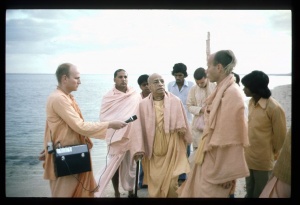CC Madhya 20.58: Difference between revisions
m (1 revision(s)) |
(Vanibot #0054 edit - transform synonyms into clickable links, which search similar occurrences) |
||
| (One intermediate revision by one other user not shown) | |||
| Line 1: | Line 1: | ||
{{ | [[Category:Sri Caitanya-caritamrta - Madhya-lila Chapter 20|C058]] | ||
<div style="float:left">'''[[Sri Caitanya-caritamrta|Śrī Caitanya-caritāmṛta]] - [[CC Madhya|Madhya-līlā]] - [[CC Madhya 20|Chapter 20: Lord Śrī Caitanya Mahāprabhu Instructs Sanātana Gosvāmī in the Science of the Absolute Truth]]'''</div> | |||
<div style="float:right">[[File:Go-previous.png|link=CC Madhya 20.57|Madhya-līlā 20.57]] '''[[CC Madhya 20.57|Madhya-līlā 20.57]] - [[CC Madhya 20.59|Madhya-līlā 20.59]]''' [[File:Go-next.png|link=CC Madhya 20.59|Madhya-līlā 20.59]]</div> | |||
{{CompareVersions|CC|Madhya 20.58|CC 1975|CC 1996}} | |||
{{RandomImage}} | |||
==== TEXT 58 ==== | ==== TEXT 58 ==== | ||
<div | <div class="verse"> | ||
na me ’bhaktaś catur-vedī | :na me ’bhaktaś catur-vedī | ||
mad-bhaktaḥ śva-pacaḥ priyaḥ | :mad-bhaktaḥ śva-pacaḥ priyaḥ | ||
tasmai deyaṁ tato grāhyaṁ | :tasmai deyaṁ tato grāhyaṁ | ||
sa ca pūjyo yathā hy aham | :sa ca pūjyo yathā hy aham | ||
</div> | </div> | ||
| Line 14: | Line 18: | ||
==== SYNONYMS ==== | ==== SYNONYMS ==== | ||
<div | <div class="synonyms"> | ||
''[//vanipedia.org/wiki/Special:VaniSearch?s=na&tab=syno_o&ds=1 na]'' — not; ''[//vanipedia.org/wiki/Special:VaniSearch?s=me&tab=syno_o&ds=1 me]'' — My; ''[//vanipedia.org/wiki/Special:VaniSearch?s=abhaktaḥ&tab=syno_o&ds=1 abhaktaḥ]'' — devoid of pure devotional service; ''[//vanipedia.org/wiki/Special:VaniSearch?s=catuḥ&tab=syno_o&ds=1 catuḥ]-[//vanipedia.org/wiki/Special:VaniSearch?s=vedī&tab=syno_o&ds=1 vedī]'' — a scholar in the four ''Vedas''; ''[//vanipedia.org/wiki/Special:VaniSearch?s=mat&tab=syno_o&ds=1 mat]-[//vanipedia.org/wiki/Special:VaniSearch?s=bhaktaḥ&tab=syno_o&ds=1 bhaktaḥ]'' — My devotee; ''[//vanipedia.org/wiki/Special:VaniSearch?s=śva&tab=syno_o&ds=1 śva]-[//vanipedia.org/wiki/Special:VaniSearch?s=pacaḥ&tab=syno_o&ds=1 pacaḥ]'' — even from a family of dog-eaters; ''[//vanipedia.org/wiki/Special:VaniSearch?s=priyaḥ&tab=syno_o&ds=1 priyaḥ]'' — very dear; ''[//vanipedia.org/wiki/Special:VaniSearch?s=tasmai&tab=syno_o&ds=1 tasmai]'' — to him (a pure devotee, even though born in a very low family); ''[//vanipedia.org/wiki/Special:VaniSearch?s=deyam&tab=syno_o&ds=1 deyam]'' — should be given; ''[//vanipedia.org/wiki/Special:VaniSearch?s=tataḥ&tab=syno_o&ds=1 tataḥ]'' — from him; ''[//vanipedia.org/wiki/Special:VaniSearch?s=grāhyam&tab=syno_o&ds=1 grāhyam]'' — should be accepted (remnants of food); ''[//vanipedia.org/wiki/Special:VaniSearch?s=saḥ&tab=syno_o&ds=1 saḥ]'' — that person; ''[//vanipedia.org/wiki/Special:VaniSearch?s=ca&tab=syno_o&ds=1 ca]'' — also; ''[//vanipedia.org/wiki/Special:VaniSearch?s=pūjyaḥ&tab=syno_o&ds=1 pūjyaḥ]'' — worshipable; ''[//vanipedia.org/wiki/Special:VaniSearch?s=yathā&tab=syno_o&ds=1 yathā]'' — as much as; ''[//vanipedia.org/wiki/Special:VaniSearch?s=hi&tab=syno_o&ds=1 hi]'' — certainly; ''[//vanipedia.org/wiki/Special:VaniSearch?s=aham&tab=syno_o&ds=1 aham]'' — I. | |||
</div> | </div> | ||
| Line 21: | Line 25: | ||
==== TRANSLATION ==== | ==== TRANSLATION ==== | ||
<div | <div class="translation"> | ||
“[Lord Kṛṣṇa said:] ‘Even though a person is a very learned scholar of the Sanskrit Vedic literatures, he is not accepted as My devotee unless he is pure in devotional service. However, even though a person is born in a family of dog-eaters, he is very dear to Me if he is a pure devotee who has no motive to enjoy fruitive activity or mental speculation. Indeed, all respects should be given to him, and whatever he offers should be accepted. Such devotees are as worshipable as I am.’ | “[Lord Kṛṣṇa said:] ‘Even though a person is a very learned scholar of the Sanskrit Vedic literatures, he is not accepted as My devotee unless he is pure in devotional service. However, even though a person is born in a family of dog-eaters, he is very dear to Me if he is a pure devotee who has no motive to enjoy fruitive activity or mental speculation. Indeed, all respects should be given to him, and whatever he offers should be accepted. Such devotees are as worshipable as I am.’ | ||
</div> | </div> | ||
| Line 28: | Line 32: | ||
==== PURPORT ==== | ==== PURPORT ==== | ||
<div | <div class="purport"> | ||
This verse is included in the Hari-bhakti-vilāsa (10.127), compiled by Sanātana Gosvāmī. | This verse is included in the ''Hari-bhakti-vilāsa'' (10.127), compiled by Sanātana Gosvāmī. | ||
</div> | </div> | ||
__NOTOC__ | |||
<div style="float:right; clear:both;">[[File:Go-previous.png|link=CC Madhya 20.57|Madhya-līlā 20.57]] '''[[CC Madhya 20.57|Madhya-līlā 20.57]] - [[CC Madhya 20.59|Madhya-līlā 20.59]]''' [[File:Go-next.png|link=CC Madhya 20.59|Madhya-līlā 20.59]]</div> | |||
__NOTOC__ | |||
__NOEDITSECTION__ | |||
Latest revision as of 22:46, 19 February 2024

A.C. Bhaktivedanta Swami Prabhupada
TEXT 58
- na me ’bhaktaś catur-vedī
- mad-bhaktaḥ śva-pacaḥ priyaḥ
- tasmai deyaṁ tato grāhyaṁ
- sa ca pūjyo yathā hy aham
SYNONYMS
na — not; me — My; abhaktaḥ — devoid of pure devotional service; catuḥ-vedī — a scholar in the four Vedas; mat-bhaktaḥ — My devotee; śva-pacaḥ — even from a family of dog-eaters; priyaḥ — very dear; tasmai — to him (a pure devotee, even though born in a very low family); deyam — should be given; tataḥ — from him; grāhyam — should be accepted (remnants of food); saḥ — that person; ca — also; pūjyaḥ — worshipable; yathā — as much as; hi — certainly; aham — I.
TRANSLATION
“[Lord Kṛṣṇa said:] ‘Even though a person is a very learned scholar of the Sanskrit Vedic literatures, he is not accepted as My devotee unless he is pure in devotional service. However, even though a person is born in a family of dog-eaters, he is very dear to Me if he is a pure devotee who has no motive to enjoy fruitive activity or mental speculation. Indeed, all respects should be given to him, and whatever he offers should be accepted. Such devotees are as worshipable as I am.’
PURPORT
This verse is included in the Hari-bhakti-vilāsa (10.127), compiled by Sanātana Gosvāmī.